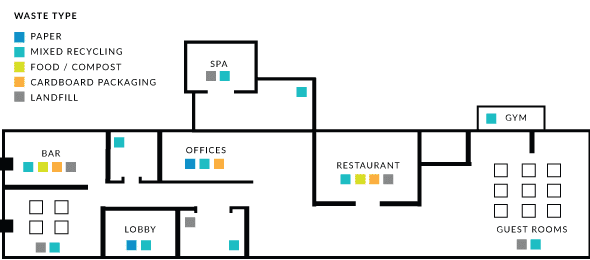The hospitality industry produces millions of tons of waste every year, with the average hotel guest contributing an estimated 2.5 pounds of trash per day. Hotels are known for creating large volumes of waste, most of which is sent to landfill. Luckily, through industry-best practices and strategies, recycling is a great opportunity for hotels, as 50-60% of their total waste stream is estimated to be recyclable. Read on to learn about the waste challenges the hospitality industry is faced with and solutions to help them divert their materials from landfill.
Common Objections To Recycling
We have found that hotel managers are faced with a number of concerns when it comes to managing their waste that result in high costs and most of their materials being sent to landfill.
According to Waste Management World, one of the main objections to recycling is lack of space. The article claims, "In most hotel buildings, as much space as possible is usually allocated to front-of-house areas such as the reception, lobby, restaurant and banqueting facilities. This leaves minimal space back-of-house for waste to be stored and sorted." The shortage of space makes managers feel like they don't have enough room to manage a recycling program.
In addition to space limitations, managing the many forms of hotel waste can be difficult. From the mini soap and shampoo bottles in each guest's room to large amounts of food waste from restaurants, the large, diverse volumes of waste can make efficiently recycling them a second thought.
Hotels also struggle with getting guests to buy-in to their recycling programs. Many people recycle at home, but who's to say guests will recycle when traveling?
The Suite Life of Recycling: Solutions to the Objections
A lot of the points mentioned above can be troubling for hotel managers, but an efficient recycling program can significantly help hotels reduce their waste.
Hotels are actually in a great position to recycle, because most of their waste consists of food, office paper, cardboard, aluminum cans, and plastic bottles. By identifying the materials your hotel uses the most can help you determine the best practices to easily recycle them. For example, sources claim as much as 40% of their waste stream consists of cardboard packaging. Simply breaking down cardboard and implementing other best practices can save hotels space, time, and money. Additionally, studies have found that nearly 50% their waste consists of food. Many hotels have developed programs like composting to help divert a lot of this waste from their containers.

Developing a waste map like the one above is a helpful tool that allows management to pin-point waste at its source. This strategy can help get employee and guest buy-in by identifying convenient, high-traffic areas to place waste and recycling bins throughout the hotel.
Hotels are also minimizing waste by eliminating the use of single-use items. An article from The Wall Street Journal claims that the mini bottles are never refilled and rarely recycled, leading to tons of waste. The article explains that eliminating the mini bottles and switching to larger bottles that are mounted to the shower wall can save 10.3 million bottles or 113,000 pounds of plastic annually.
Sometimes managing large volumes of waste on a regular basis can be intimidating, but many hotels have found that implementing recycling strategies isn't difficult, and the benefits are worth it! Let us know your hotels best recycling strategies in the comment section below. If you have any questions, feel free to get in touch with us. Thanks for reading!
